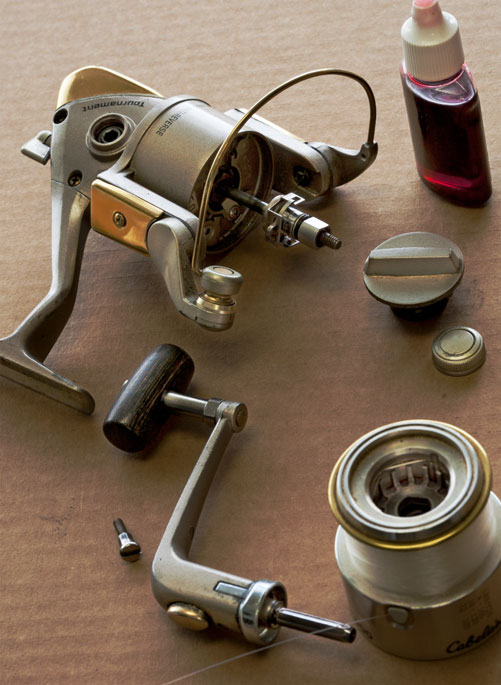BY Kevin Kelly
Planning a fishing trip more than a couple days ahead of time can be a gamble in late winter when the weather is a mixed bag and the favorable conditions here today may be gone tomorrow.

With some advance preparation, you can be ready to grab what you need and go when that friend calls at daybreak or the impulse strikes and the schedule allows for a last-minute trip.
Performing regular maintenance on your reels can prevent catastrophic problems or costly repairs down the road.
Over the course of a fishing season, grit and grime accumulate and work into the guts of a reel. A hitch in the retrieve signals a reel in need of immediate maintenance. Keep cotton swabs, rubbing alcohol, an old toothbrush, paper towels, reel oil and reel grease on hand to accomplish this task, but consult the reel owner’s manual or the manufacturer’s website for its recommendations.
Some wait until a reel is almost bare of line before replenishing the spool. Imagine the disappointment to have the biggest fish of your life break off or not have enough line to cast to a desired spot. Go ahead and invest in a new spool of line for the peace of mind.
Monofilament and fluorocarbon lines require more frequent replacement than braided lines. Match the line with the manufacturer’s recommendations for the reel and take care to load the line correctly to avoid line twist, which can lead to those annoying bird’s nests.
Likewise, clean and inspect any rods that were stored over the winter. Check the reel seats and tighten the lock nuts as needed. Repair or replace worn or broken rod guides. Brush the inside of the guides with a cotton swab. The cotton will snag on any sharp edges or burs.
Keeping your tackle organized can be a challenge once spring arrives. Why not start fresh? Stowaway utility boxes are an angler’s friend. These plastic containers come in all shapes and sizes and prove useful for storing baits, weights, jig heads, hooks and more. Organize soft plastics by color and type in separate sealable sandwich bags and store the bags in one of these clear plastic tackle boxes or a binder.
A dull hook decreases the odds of a good hook set, so take a moment while everything is out to sharpen hooks on crankbaits, jerkbaits and spinnerbaits.
Some anglers organize their tackle by species or waterbody type to cut down on time and the hassle of picking and choosing from several boxes the night before or day of a trip.
If you’re running low on an item, look for off-season and pre-season sales to help stretch your dollar.
Aside from equipment maintenance and organization, it is important to carve out some time to review the Kentucky Fishing and Boating Guide. The 2017-18 version is available online at fw.ky.gov and wherever licenses are sold.
The guide points out any changes in regulation. New fishing regulations that will go into effect March 1 include the removal of a statewide daily creel limit for yellow bass. Trammel Creek in Allen County remains under seasonal catch and release regulations from Oct. 1 through March 31 but the daily creel limit for rainbow trout will be five from April 1 through Sept. 30. Lakes and sloughs at Ballard Wildlife Management Area (WMA) and Boatwright WMA in Ballard County will be idle speed only for all boats. Likewise, Beulah Lake in Jackson County will be idle speed only for all boats. Largemouth bass at Pennyrile Lake in Christian County will be under statewide regulations.
Available on the Kentucky Department of Fish and Wildlife Resources’ website, the annual fishing forecast for the state’s major fisheries provides helpful tips for a more productive day on the water. Carpenter Lake in Daviess County for largemouth bass and the upper Barren River for largemouth and spotted bass, bluegill in Fagan Branch Lake in Marion County and crappie at Benjy Kinman Lake in Henry County are noted in this year’s forecast as up-and-coming fisheries.
The new license year starts March 1. Kentucky fishing licenses may be purchased online at fw.ky.gov or by calling 1-877-598-2401. Licenses and permits also can be bought at retail stores, county court clerk offices and outdoor sporting goods stores across the state. License vendor locations are listed on Kentucky Fish and Wildlife’s website.
In the meantime, there is still some time to squeeze even more value out of your 2016-17 fishing licenses. They’re valid through Feb. 28.
While not everybody has the luxury of being able to drop everything and go fishing when the conditions are ideal, you can save precious time by being prepared so you can take advantage when an opportunity does present itself.
Author Kevin Kelly is a staff writer for Kentucky Afield magazine, the official publication of the Kentucky Department of Fish and Wildlife Resources. Get the latest from Kevin and the entire Kentucky Afield staff by following them on Twitter: @kyafield.


Be the first to comment